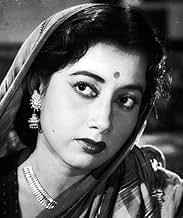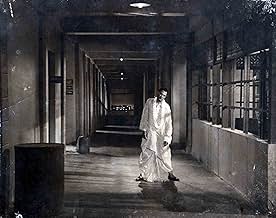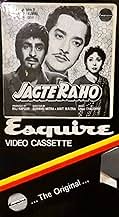IMDb RATING
8.1/10
1.1K
YOUR RATING
An innocent guy who has arrived from a village to Kolkata gets himself involved into trouble in search of water after he gets thirsty in the middle of the night.An innocent guy who has arrived from a village to Kolkata gets himself involved into trouble in search of water after he gets thirsty in the middle of the night.An innocent guy who has arrived from a village to Kolkata gets himself involved into trouble in search of water after he gets thirsty in the middle of the night.
- Awards
- 1 win & 1 nomination total
Pahadi Sanyal
- Shashan - Meenu's husband
- (as Pahari Sanyal)
Sulochana Chatterjee
- Meenu
- (as Sulochana Chaterjee)
Iftekhar
- Chandu (Leader)
- (as Iftikhar)
Moni Chatterjee
- Baral Babu
- (as Moni Chaterjee)
Featured reviews
10mehna
"Jagte Raho" a movie of Black & White celluloid era, in-my-humble-opinion, should be added to the International Movie Hall of Fame. Why? Just for one simple reason. OK. There are more than one reasons. This movie entertains, educates, makes you laugh and cry all at the same time. And to top it all, sends a striking message of humanity to the human beings all around.
What a realistic depiction of a common man's life! The movie narrates the naked truth of life's challenges in a tinsel town - the city of Bombay, especially for those unsophisticated, naive, innocent souls, who dreamed of making it big in that La-La land.
Every second of your life is a struggle even if it's for a drop of drinking water. What a great acting by (my idol) Raj Kapoor (R.I.P)! A very simple concept, a great story & a script and the deep message it sent to the society or should I say the world over.
How a thirsty innocent man is deliberately branded a thief by some of the biggest phonies of this world who like to call themselves "Shareef" (reputable) citizens. And these so-called reputable citizens make a scapegoat out of this poor, helpless and vulnerable soul, just so that they can hide the skeletons of their own in the proverbial "closet".
It absolutely disappoints and saddens me to see a man go through what he went through, in one night just for a mere sip of tap water to quench his thirst.
What a great performance by the entire crew (on and off the screen), and especially, Raj Kapoor and Motilal!
One has to watch the movie with a perspective that even today, millions of people back home in India(and many other parts of the world) have daily struggles to put up for a few drops of water
And this makes my heart cry and eyes filled with water.
Too bad they don't make movies like this anymore.
Long live Raj Kapoor and "Jagte Raho".
What a realistic depiction of a common man's life! The movie narrates the naked truth of life's challenges in a tinsel town - the city of Bombay, especially for those unsophisticated, naive, innocent souls, who dreamed of making it big in that La-La land.
Every second of your life is a struggle even if it's for a drop of drinking water. What a great acting by (my idol) Raj Kapoor (R.I.P)! A very simple concept, a great story & a script and the deep message it sent to the society or should I say the world over.
How a thirsty innocent man is deliberately branded a thief by some of the biggest phonies of this world who like to call themselves "Shareef" (reputable) citizens. And these so-called reputable citizens make a scapegoat out of this poor, helpless and vulnerable soul, just so that they can hide the skeletons of their own in the proverbial "closet".
It absolutely disappoints and saddens me to see a man go through what he went through, in one night just for a mere sip of tap water to quench his thirst.
What a great performance by the entire crew (on and off the screen), and especially, Raj Kapoor and Motilal!
One has to watch the movie with a perspective that even today, millions of people back home in India(and many other parts of the world) have daily struggles to put up for a few drops of water
And this makes my heart cry and eyes filled with water.
Too bad they don't make movies like this anymore.
Long live Raj Kapoor and "Jagte Raho".
What worked:
- screenplay is relevant and fresh, and can be analyzed in any generation. The movie theme is powerful, engaging and brutal. The lead actor has shown grace and depth to the character which makes it a believable narrative. The story is unique and powerful storytelling makes it a wonderful watch.
- glorified scenes and setting; maybe many scenes of the movie are superficial and feels like an unreal setting. The chase and run scenes feel repetitive and less creative. However, the final result of the movie is a powerful watch.
Jagte Raho is the simple story of a naive peasant who in hopes of improving his lifestyle, a poor peasant re-locates to Bombay virtually penniless. It is late at night and he is thirsty, and he is unable to find water anywhere. Then he sneaks into a multi-storied apartment complex, and is mistaken for a thief. The complex consists of over 200 units, and is housing nearly a 1000 people they all set out to hunt him down. Whilst evading capture, he inadvertently exposes the venality and dishonesty of the building's middle class occupants.
The film shows the double standards of our society, the cruelty and the corruptness, but not in a stereotypical way. It is natural and real. This naive peasant represents the simple common man who becomes a victim for no fault of his own. He encounters different sorts of thefts and crimes committed by those so-called "respectable" citizens of the city, those who call him a thief and chase him just because he yearns for a few drops of water so that they can hide their own misdemeanors. This is so unbelievable yet so true.
The character of the naïve peasant requires great facial expression as it don't have many dialogues but he emotes constantly, and Raj Kapoor being a Theater person have brilliantly achieved this.
I think that to analyze this film, firstly one has to understand the social environment of that era. During that time people where migrating to metros in search of jobs and stable life. However here they become victim of the bourgeois society. Film-Maker has very brilliantly weaved the beautiful story in this concept. I liked the metaphors used in the film which creates an impact on the viewer. Like a character of a child in a climax is a metaphor of new beginning. There are many more such metaphors in this film. There are sometimes when overuse of background scores have spoiled the impact of the emotions. Sometimes the acting is also too dramatic and theatrical to digest. However I also think that this is deliberated by the director as during those times audience demand such things which I can say after watching films from those era.
The film shows the double standards of our society, the cruelty and the corruptness, but not in a stereotypical way. It is natural and real. This naive peasant represents the simple common man who becomes a victim for no fault of his own. He encounters different sorts of thefts and crimes committed by those so-called "respectable" citizens of the city, those who call him a thief and chase him just because he yearns for a few drops of water so that they can hide their own misdemeanors. This is so unbelievable yet so true.
The character of the naïve peasant requires great facial expression as it don't have many dialogues but he emotes constantly, and Raj Kapoor being a Theater person have brilliantly achieved this.
I think that to analyze this film, firstly one has to understand the social environment of that era. During that time people where migrating to metros in search of jobs and stable life. However here they become victim of the bourgeois society. Film-Maker has very brilliantly weaved the beautiful story in this concept. I liked the metaphors used in the film which creates an impact on the viewer. Like a character of a child in a climax is a metaphor of new beginning. There are many more such metaphors in this film. There are sometimes when overuse of background scores have spoiled the impact of the emotions. Sometimes the acting is also too dramatic and theatrical to digest. However I also think that this is deliberated by the director as during those times audience demand such things which I can say after watching films from those era.
"Jagte Raho," a cinematic gem from 1956, is a profound social commentary wrapped in the guise of a gripping drama. Directed by Amit Maitra and Sombhu Mitra, and written by the legendary K. A. Abbas, the film stars Raj Kapoor in a role that is as endearing as it is significant.
The narrative follows the plight of a simple villager, portrayed with remarkable nuance by Kapoor, who ventures into the city with hopes of a better life. His quest for a mere sip of water lands him in an apartment complex, where he is mistaken for a thief. This misunderstanding sets off a chain of events that exposes the hypocrisy and corruption of the urban middle class.
"Jagte Raho" is a film that transcends time, with themes as relevant today as they were in the 1950s. The performances are stellar, with Kapoor leading a cast that includes the talented Nargis in a memorable cameo. The direction is masterful, weaving a narrative that is both intimate and expansive.
The music, composed by Salil Choudhury, with lyrics by Shailendra and Prem Dhawan, is another highlight. The songs, including the iconic "Zindagi Khawab Hai," performed by Mukesh, add a lyrical depth to the film's poignant storytelling.
The film's climax is particularly striking, offering a resolution that is both hopeful and heartrending. "Jagte Raho" won the Crystal Globe Grand Prix at the Karlovy Vary International Film Festival, a testament to its universal appeal and enduring legacy1.
In summary, "Jagte Raho" is not just a film; it's a powerful exploration of human nature and societal flaws. It's a must-watch for anyone who appreciates cinema that challenges, entertains, and enlightens.
The narrative follows the plight of a simple villager, portrayed with remarkable nuance by Kapoor, who ventures into the city with hopes of a better life. His quest for a mere sip of water lands him in an apartment complex, where he is mistaken for a thief. This misunderstanding sets off a chain of events that exposes the hypocrisy and corruption of the urban middle class.
"Jagte Raho" is a film that transcends time, with themes as relevant today as they were in the 1950s. The performances are stellar, with Kapoor leading a cast that includes the talented Nargis in a memorable cameo. The direction is masterful, weaving a narrative that is both intimate and expansive.
The music, composed by Salil Choudhury, with lyrics by Shailendra and Prem Dhawan, is another highlight. The songs, including the iconic "Zindagi Khawab Hai," performed by Mukesh, add a lyrical depth to the film's poignant storytelling.
The film's climax is particularly striking, offering a resolution that is both hopeful and heartrending. "Jagte Raho" won the Crystal Globe Grand Prix at the Karlovy Vary International Film Festival, a testament to its universal appeal and enduring legacy1.
In summary, "Jagte Raho" is not just a film; it's a powerful exploration of human nature and societal flaws. It's a must-watch for anyone who appreciates cinema that challenges, entertains, and enlightens.
Jagte Raho is one of the most amazing classics of Indian cinema. It is sad, comic, tragic, humorous, authentic, educative and entertaining. This magnificent social dramedy relates the story of one poor and innocent peasant who comes to the big city of Bombay in hopes of improving his life. However, while looking for some water to quench his thirst, he is constantly branded a thief by the citizens of the city and chased like a criminal. Looking for a hideout, still thirsty and hungry, he enters an apartment building, running from one flat to another, and ironically, every flat he hides in, he meets different "elite" citizens, all of whom can be easily called thieves.
The film shows the double standards of our society, the cruelty and the corruptness, but not in a stereotypical way. It is natural and real. This naive peasant represents the simple common man who becomes a victim for no fault of his own, not only in India but in the entire world. He encounters different sorts of thefts and crimes committed by those so-called "respectable" citizens of the city, those who call him a thief and chase him just because he yearns for a few drops of water so that they can hide their own misdemeanors. This is so unbelievable yet so true.
Raj Kapoor is the film's main protagonist and may I say, this is one of the finest works of his career, both as a filmmaker and particularly as an actor. The fear in his eyes is so haunting. You really feel for him as you witness his pain, his thirst, his misery, his innocence and his helplessness. The film's final scenes are absolutely fantastic. Kapoor's outburst on the roof of the building in front of the entire nation as he reproaches them for their inhumanity is well-done.
The next two scenes are the film's final and finest. The first, when he gets onto the porch of another flat where he meets the cute-as-a-button Daisy Irani is heart-breaking. Irani's five-minute role of a kind-hearted, joyful and fearless little girl (which is contrary to the rest of the building's residents) who motivates the peasant to exit the building and face the people, is very memorable. There starts the film's best song, "Jago Mohan Pyaare" and we meet a young woman played by Nargis. The graciousness in her eyes and the brief, wordless interaction between Kapoor and Nargis create a magical, unforgettable scene which brings to a beautiful ending. See the film to understand how beautiful it is. This truly is an extraordinary picture.
The film shows the double standards of our society, the cruelty and the corruptness, but not in a stereotypical way. It is natural and real. This naive peasant represents the simple common man who becomes a victim for no fault of his own, not only in India but in the entire world. He encounters different sorts of thefts and crimes committed by those so-called "respectable" citizens of the city, those who call him a thief and chase him just because he yearns for a few drops of water so that they can hide their own misdemeanors. This is so unbelievable yet so true.
Raj Kapoor is the film's main protagonist and may I say, this is one of the finest works of his career, both as a filmmaker and particularly as an actor. The fear in his eyes is so haunting. You really feel for him as you witness his pain, his thirst, his misery, his innocence and his helplessness. The film's final scenes are absolutely fantastic. Kapoor's outburst on the roof of the building in front of the entire nation as he reproaches them for their inhumanity is well-done.
The next two scenes are the film's final and finest. The first, when he gets onto the porch of another flat where he meets the cute-as-a-button Daisy Irani is heart-breaking. Irani's five-minute role of a kind-hearted, joyful and fearless little girl (which is contrary to the rest of the building's residents) who motivates the peasant to exit the building and face the people, is very memorable. There starts the film's best song, "Jago Mohan Pyaare" and we meet a young woman played by Nargis. The graciousness in her eyes and the brief, wordless interaction between Kapoor and Nargis create a magical, unforgettable scene which brings to a beautiful ending. See the film to understand how beautiful it is. This truly is an extraordinary picture.
Did you know
- TriviaA shortened version of the film won the Crystal Globe Grand Prix at the Karlovy Vary International Film Festival in Czechoslovakia in 1957.
- ConnectionsReferenced in India: Matri Bhumi (1959)
- SoundtracksZindagi Khawab Hai, Khvaab Me Jhuth Kya Aur Bhala Sach Hai Kya
Sung by Mukesh
Details
- Runtime2 hours 33 minutes
- Color
- Sound mix
- Aspect ratio
- 1.37 : 1
Contribute to this page
Suggest an edit or add missing content






























